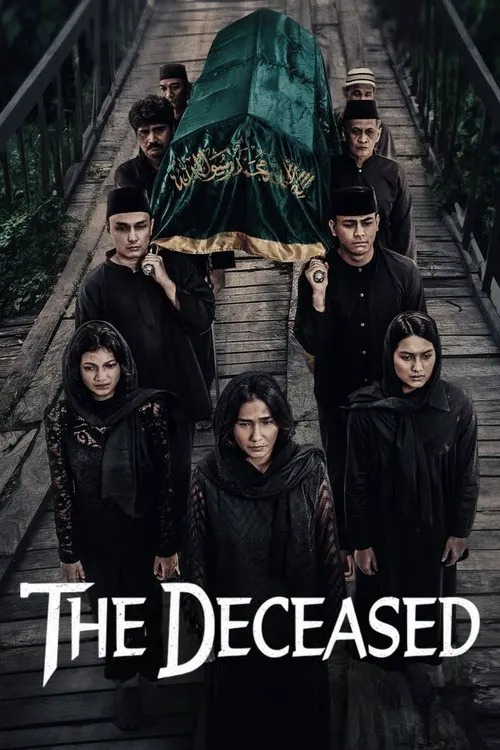The Deceased

Plot
In the mysterious and unsettling film 'The Deceased,' the sibling duo of Nuri and Yanda finds themselves confronted with unspeakable terror after the passing of their father on a day rumored to be cursed. The air is thick with unease and foreboding, as the once-peaceful lives of the two children are turned upside down by the consequences of this fateful event. The boys' father, whose life was marked by a deep understanding of the local mythology, had always warned his children about the day of his eventual demise. A day when, according to ancient lore, the veil between the living and the dead becomes blurred, and the deceased return to roam the earth. The siblings are well-aware of the supernatural happenings that have taken place on this day in the past, which, according to local legend, will bring chaos, destruction, and death. As the day of the father's passing unfolds, Nuri and Yanda, along with their older brother, experience inexplicable occurrences that seem to be connected to the day's eerie energies. Doors slam shut on their own, disembodied voices are heard echoing in the walls, and strange, unsettling shadows begin to manifest themselves. The brothers begin to feel the presence of their father's spirit lingering, even as they lay his lifeless body to rest in their family's small, rustic village. Throughout the film, the local myths and superstitions surrounding the cursed day are woven intricately into the narrative. The brothers learn about the sacred rituals designed to ward off evil spirits and the dire consequences of failing to adhere to these time-honored customs. Yanda, a deeply spiritual young boy, becomes increasingly obsessed with believing that the local legend can indeed safeguard his family from the impending doom that appears imminent. As Yanda delves deeper into the mysterious world of local myths, Nuri becomes increasingly torn. While Yanda fervently clings to his faith, Nuri is drawn to the harsh, logical reality that lies at the heart of the day's malevolent power. This clash of convictions is made all the more poignant when Yanda's insistence on carrying out the ancient rituals begins to attract attention from a group of villagers who are skeptical of the family's beliefs. One of the villagers, a charismatic but enigmatic character, reveals to Yanda the significance of their village's age-old traditions. In exchange for the secrets shared, Yanda is forced to make a perilous decision that would either secure their family's safety or speed up the impending doom. Torn between his loyalty to his family and his need to save them from the impending horror, Nuri feels an ominous connection forming between them. As the brothers continue to grapple with their differences, Nuri starts questioning the reality and origins of the myths surrounding the cursed day. A dark and sinister force has been awakened in the air, urging the family to head into the night, into the very heart of the village, where an expected doom awaits them. The eerie shadows that have been following them throughout their ordeal now start to reveal themselves in a more ominous way, turning the family's confrontation into an explosive encounter. It is during this raw, unsettling experience that Nuri discovers the secrets hidden in his family's troubled history and the consequences of trusting an unreliable source. As fate tries to turn against the family, the three brothers, the father's spirit, and the ghosts that haunt the land must endure the full brunt of the demonic entity awakened by the mysterious circumstances of the day.
Reviews
Maria
Every bizarre and outlandish scene is a fragmented and unique carnival. Every separation of life and death is a reversed stretching of clinging affection. Every lament for the dying and passing is a countermarch to the exuberance of youth. Every plunge into the abyss is a morning drum and evening bell of perfect stillness.
Oaklyn
A wandering circus troupe, the beautiful woman next door. Eerie adolescent dreams, a rural death; a clock on the wall, a hole in the ground. A century of solitude, farewell to the ark.
Ashton
I thought I could shed tears of vibrant hues, only to realize it was just the color of the air in a Terayama film.
Taylor
Terayama Shuji's films are known for three recurring motifs: incest, dreamscapes, and timepieces.
Juniper
The visuals are undeniably striking, but it's hard to give it a high score. First, the entire film is built upon the sexualization of female figures – be it the young wife, the femme fatale, or the pregnant girl. Despite the director's apparent desire to portray the suffering of all beings, these female archetypes ultimately serve his own sexual fantasies. The exploration of existence and childhood feels shallow and disjointed; while the ending is impressive, it can't fully redeem the film's flaws. Overall, it carries a strong sense of middle-aged male fantasy.
Recommendations



